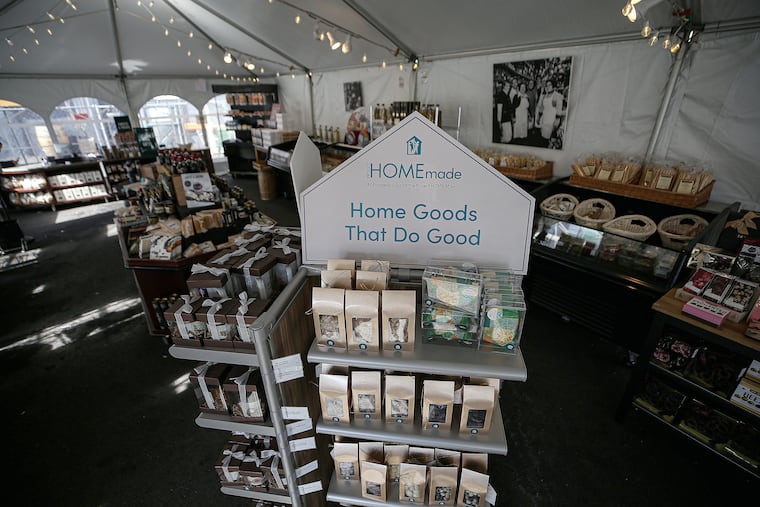Di Bruno Bros. wants to expand where Project HOME products are sold
The Di Bruno Bros. philosophy is that poverty isn’t just a City Hall problem, but a Main Street problem as well.

For years, poverty fighters in Philadelphia have preached the importance of business joining government to help those in need.
Di Bruno Bros., the Philadelphia-based food purveyor, has embraced the idea.
“It’s not just a City Hall problem but a Main Street problem,” said Bill Mignucci, president of Di Bruno Bros. “Business and government have to come together. We want to be part of a movement.”
Over the last two years, the company has partnered with Project HOME, the Philadelphia nonprofit that combats homelessness, by stocking products created by formerly homeless people now living at the agency, such as candles.
Their latest collaboration is a larger, more directed effort to highlight the people being helped by Project HOME: a kiosk of goods made, packaged, or curated by individuals who were once homeless. It includes a larger variety of candles, along with mugs featuring resident art, and other products bearing Project HOME logos. It stands in an outdoor tent at the Di Bruno Bros. Italian Market site, available Fridays, Saturdays, and Sundays.
That’s considered a “soft opening” by Mignucci, who wants to help Project HOME increase the number of kiosks to numerous retail spots throughout the city.
“We’re here to build a sustainable model that gets replicated in other places,” said Mignucci. “They would be managed, inventoried, and maintained by Project HOME residents,” and, with luck, take in around $100,000 a year for the agency.
Di Bruno Bros. stores have stocked Project HOME objects on shelves during the holidays in 2019 and last year, including Sister Mary’s Sinfully Delicious Cranberry Sauce, based on a family recipe from Project HOME’s executive director, Sister Mary Scullion.
Project HOME sold $30,000 in products during the 2019 holiday season in Di Bruno Bros. stores, on the food company’s website, and on the agency’s website, Project HOMEmade.org, agency figures show. Last year, the agency made $40,000. The agency also sells goods in its Fairmount store, Project HOME Thrift.
Proceeds go to the formerly homeless Project HOME artisans who have known chaos, who’ve been disconnected from the grid, and have bedded down in the weather on Philadelphia hardscape, their lives not so much lived as endured.
The kiosks are small steps, but important to Mignucci, who’s tried to become a student of local poverty.
“It perplexes me,” he said, “in a city with so much history and success, that we don’t seem to get much traction and momentum against poverty.
“I love Philadelphia and I’m troubled and frustrated and embarrassed that we lead America’s biggest cities in the poverty rate. It’s not something I’m very proud of. The business community has to take some responsibility for poverty, and I want to be a resource.
Conscious consumerism
Project HOME is hoping to be a part of the growing trend known as conscious consumerism — when buying practices are driven by a commitment to make positive social impact.
“Conscious consumerism is in the forefront of people’s minds,” said Nic Watson, director of social enterprise for Project HOME. “We’re trying to get our products and name out there to make it easy for people in Philadelphia to buy them and support ending homelessness to make our city better.”
Watson, who has an MBA from New York University and once worked as a line producer on the pilot of the Food Network TV program Chopped, said the goal is to make Project HOME a ubiquitous brand in the city:
“We want you to be able to walk into a high-end gift store and get a Project HOME gift for a friend that supports us.”
Watson said his current “pipe dream” is to place Project HOME merchandise in Whole Foods stores. Stay tuned, he advised.
Along with raising funds, social enterprise work at Project HOME is meant to springboard residents into real jobs. Around 17 of 31 Project HOME resident artisans have gotten into competitive jobs after making candles and doing other projects between 2018 and 2019, Watson said.
The agency also makes some money through its Project HOME Books, an online business that sells donated books.
Because of the pandemic, not all agency activities can carry on as usual. That makes things tough for Kai Oceans, 31, a Project HOME resident and sales associate who’s currently the only candlemaker working. Oceans created 500 candles since COVID-19 hit, but doesn’t tire of getting the Project HOME name out into the world.
Oceans, who grew up in Germantown and lived for a time in a West Philadelphia homeless shelter, is on a mission.
“No matter what a person has gone through and what they look like,” Oceans said, “they have value. And anyone is capable of overcoming adversity.”
Right now, Oceans is pushing a new candle called Love Unites Us. It’s not about romance, Oceans said, “but the message of Dr. Martin Luther King — how love unites us as a community, and a world.”
Project HOME describes the scent as “smooth and sweet, with spicy notes.”
But, Oceans promised, if you buy the candle (for $28), “You’ll become a direct part of our mission. Our core message is that everyone has value.
“And you could become part of someone’s success story.”